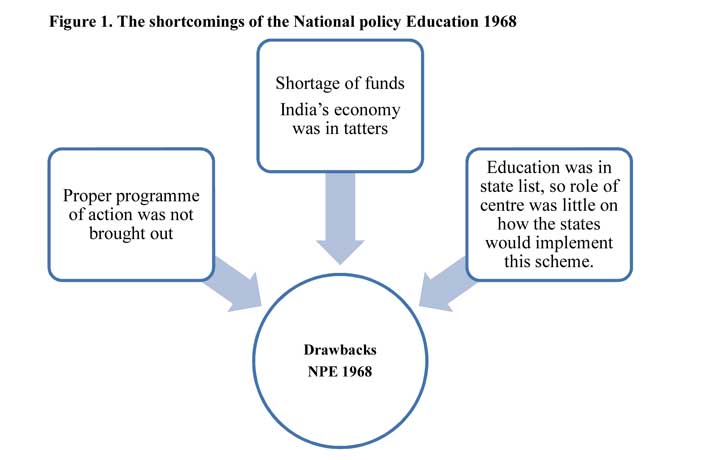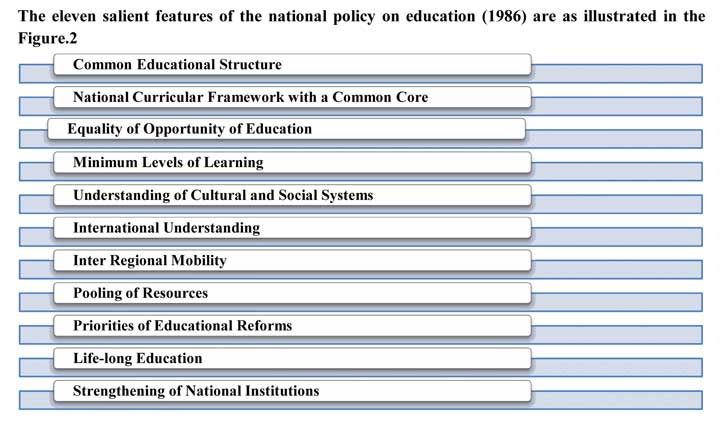Subscribe now to get notified about IU Jharkhand journal updates!
The Significant Shift in the Education Policy of India
Abstract :
Education has an acculturating role. It refines sensitivities and perceptions that add to national solidity, a logical temper and freedom of mind and spirit - thus furthering the goals of socialism, secularism and democracy enshrined in our Constitution. Education is elemental for achieving full human potential, developing an impartial and just society and promoting national development. It has always been accorded an honored position in the Indian society. The great leaders and the revolutionaries of the Indian freedom movement realized the essential role of education and all through the nation’s struggle for independence, stressed its exceptional significance for national development. Since the end of the British rule in 1947 India’s literacy rate has increased six times, from 12% to 74%. On the other hand, what is questionable is the quality of education - placing India among the 21 countries facing an “extensive” learning crisis. India has a quarter of its population still deprived of the basic reading and writing skills. India has the world’s largest population of illiterate people, according to a report by Oxfam and as per UNESCO India has 287 million, or 37% of the world’s illiterate people. The national policy of education was a good start in the way of educating the masses. Governments all over the world pay great importance on education policy. There is a universal pressure on ever-increasing attention on the outcomes of educational policies and their impact on social and economic development. However, there is often a deficit of understanding of how educational policies are shaped and what constitutes an education policy. This article is an attempt to analyze the recent educational policy (NEP 2020) with the previous policies on education; NEP 1968 and NEP 1986 and presenting their intended outcomes.
Keywords :
National Policy on Education; Principles; Disparity; Global setting; Sponsorship1. Introduction
Education policy constitutes of the principles and government policies in the educational field as well as the set of laws and rules that direct the operation of the education systems. Change is the only constant. As our young, progressive land strides towards development and advancing its capabilities internationally, it becomes crucial to take inspiration from our ancient heritage and cultural values to transform the existing status quo with a modern and futuristic approach. Ever since our nation's independence in 1947, the government sponsored multiple programmes to tackle the problems of illiteracy in both rural and urban India. It was the Country’s first Minister of Education, Maulana Abul Kalam Azad, who envisaged very strong central government control over education all through the country with consistent and standard educational system. The Union government established the University Education Commission (1948–1949), the Secondary Education Commission (1952–1953), University Grants Commission and the Kothari Commission (1964–66) to make proposals to renovate and improvise India's education system. The Resolution on Scientific Policy was adopted under the leadership of our first Prime Minister, Pt. Jawaharlal Nehru. The then government sponsored the development of the premium category of scientific educational institutions such as the Indian Institutes of Technology. The National Council of Educational Research and Training (NCERT) was formed as an autonomous organization in the year 1961 by the Union Cabinet as an advisory to both the Union and state governments on formulating and implementing education policies. As education is a coexisting subject (both the Centre and the state governments can make laws on it), the reforms planned can only be implemented jointly by the Centre and the states.
Since the Independence, India has had three education policies. The foremost policy that was formulated in 1968 laid emphasis on compulsory education for children up to the age of 14years. The second NPE was introduced in 1986. Major focus of the second NPE was to overcome the disparity between diverse social groups. While the 1986 policy emphasized on achieving uniformity and standardization of education across the social groups, it did not account for the cutthroat global setting, which became important with the beginning of the globalization of the Indian economy post 1991 reforms.
Let us look at the evolution of the polices and the reforms in the field of education
- University Education Commission (1948-1949).
- Secondary Education Commission (1952-1953).
- Education Commission (1964-66) under the guidance of Dr. D.S. Kothari.
- National Policy on Education (1968).
- 42nd Constitutional Amendment (1976).
- National Policy on Education (1986).
- National Policy on Education (1986) redesigned in 1992.
- T.S.R. Subramanium Committee Report(2016) 2
- Dr. K. Kasturirangan Committee Report ( 2019)
- National Policy on Education (2020)
The National Education Policy 1968
Based on the report and recommendations of the Kothari Commission (1964–1966) the first National Policy on Education was introduced in 1968under the governance of Smt. Indira Gandhi aiming towards radical restructuring and provision of equal educational opportunities to all .This was the first attempt of its kind in the nation towards establishing national growth, a sense of common citizenship and culture, and to strengthen national integration.
A 17 point agenda note was included in the policy highlighting the areas to work upon.
- Education for all children up to the age of 14 was made compulsory , as specified by the Constitution of India
- Provision for training and development of teachers was considered to be a key factor to increase effectiveness.
- More attention was to be put towards learning of regional languages, outlining the “three language formula” to be applied in secondary education that was Hindi, English and Regional Language.
- Hindi being adopted as the national Language the policy put weight on learning Hindi to promote it as a common language for all Indians.
- The policy also encouraged the values of the ancient Sanskrit language, which will always be an essential part of India’s culture and heritage.
- The NPE (1968) called for education expenditure to increase to six percent of the national income. With the drawbacks already noted there were other major issues of access, quality, quantity, efficacy and monetary outlay, accumulated over the years, to be tackled with the extreme urgency

The National Policy on Education (1986)
The National Policy on Education (1986) proposed a national system for education that would take determined steps for the universalization of primary education and the widening the exposure and scope of adult literacy, thereby becoming an tool for the reduction of disparities.
The eleven salient features of the national policy on education (1986) are as illustrated in the Figure.2

The National Policy on Education (1986).
The education policy of 1986 recommended starting of All India Educational Service. This suggestion was criticized on the ground of widening of the gulf between the teachers and bureaucracy.
The education policies stood for admission to the university classes on the basis of capability. These feature deprived many youth of university education. According to some critics the Open University can never be a good substitute for regular university classes.
The education policy of 1986 has suggested the institutions of capitation fees for admitting students in technical institutions. This could not be acknowledged as a hale and hearty policy, as this deprives worthy students of obtaining technical education on their capacity to pay.
Revision of the NPE 1986
The National Policy on Education (1986) after its implementation got opposition from the non congress parties but then Prime Minister Sh. Rajiv Gandhi sustained its implementation. In May 1990, a new committee was setup under the chairmanship of Acharya Ram Murti for the review suggesting modification on the NPE. Then in 1992, the HRD minister Sh. Arjun Singh presented the revised National Policy on Education in the parliament. The Programme of Action 1992 under NPE 1986 was designed to conduct common entrance examination on All India basis for admission to professional and technical programs in the country. The primary objective of the POA was to correct social and regional imbalances, empowerment of women and securing rightful place for the underprivileged and the minorities.
The National Policy on Education 2020
The NEP 2020 announced by Ministry of Education has received earnest welcome from the countrymen. It was approved by the Union Cabinet of India on 29 July 2020. This is the first education policy of the 21st century to substitute the thirty-four-year-old National Policy on Education (NPE), 1986. It focuses on holistic multidisciplinary education for future nation’s stakeholders.
- The NEP proposes far-reaching changes including opening up of Indian higher education to foreign universities, dismantling of the UGC and the All India Council for Technical Education (AICTE),
- Introduction of a four-year multidisciplinary undergraduate programme with numerous exit options, and discontinuance of the M Phil programme.
- For school education, the policy focuses on redesigning of the curriculum, “easier” .In the Board exams, a reduction in the syllabus is to be sought to retain “core essentials” and thrust on “experiential learning and critical thinking”.
- In a significant change from the 1986 policy, which pushed for a 10+2 structure of school education, the new NEP pitches for a “5+3+3+4” plan corresponding to the age groups of 3-8 years (foundational stage), 8-11 (preparatory stage , 11-14 (middle stage), and 14-18 (secondary stage). This brings early childhood education (also known as pre-school education for children of ages 3 to 5) under the sphere of formal schooling. The mid-day meal programme will be extended to pre-school children. The NEP proposes that the students until Class 5 should be taught in their mother tongue or regional language.
- No hard separation between curricular, extracurricular, co-curricular, amongst arts, humanities and sciences, or amongst vocational and academic streams.
- The policy also proposes phasing out of all institutions offering single streams and that all universities and colleges must seek to become multidisciplinary by 2040.
There are seven significant features or objectives of the National education policy other than from what is clearly appearing in its documentation and is in great agreement with different programs and initiatives of Government of India since 2014 like the make in India, skill India, start-up India and latest being atma-nirbhar India.
Hindrances for the current Policy on Education.
- Knowledge-Jobs disparity: There is visible disparity between the knowledge & skills imparted and the availability of the jobs. This has been one of the main challenges that have affected the Indian education system since Independence.
- Less stress on the emerging fields: NEP 2020 is silent on education related to up-and-coming technological fields like artificial intelligence, cyberspace, nanotech, etc.
- The necessity of Enormous Resources. A determined target of public spending at 6% of GDP has been stated. Mobilizing financial resources will be a major challenge, given the low tax-to-GDP ratio and challenging claims on the national exchequer of healthcare, national security and other key sectors.
The new National Education Policy (NEP) 2020 is a good policy as it aims at making the education system holistic, bendable, multidisciplinary, aligned to the needs of the 21st century and the 2030 Sustainable Development Goals. The aim of the policy seems to be perfect in many ways but it is the execution where lies the key to success.
References
- https://www.mhrd.gov.in/sites/upload_files/mhrd/files/document-reports/NPE-1968.pdf
- https://www.indiaeducation.net/indiaedudestination/policy/education-policy.aspx
- https://indianexpress.com/article/explained/reading-new-education-policy-india-schools-colleges-6531603/https://indianexpress.com/article/explained/reading-new-education-policy-india-schools-colleges-6531603/ https://www.nationalskillsnetwork.in/highlights-of-the-national-education-policy-2020/https://www.nationalskillsnetwork.in/highlights-of-the-national-education-policy-2020/
- http://thepubliceconomist.com/?p=139981
- https://blog.edsense.in/new-education-policy-2020-highlights-and-comparison-with-other-educational-policies-of-the-world/
